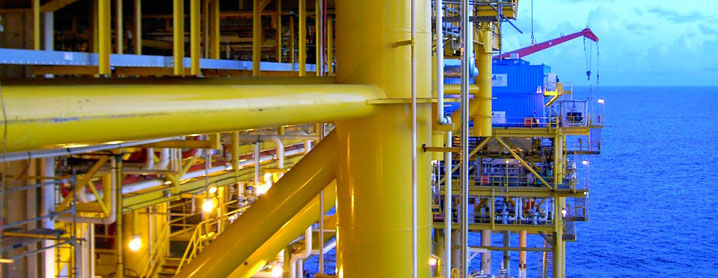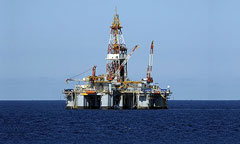Frequently Asked Questions
Offshore Oil Rigs
Frequently asked questions relating to the search for jobs and careers on offshore oil rigs, selection and recruiting processes, and requirements on board; and our job seeking services.

Frequently asked questions relating to the search for jobs and careers on offshore oil rigs, selection and recruiting processes, and requirements on board; and our job seeking services.

Considering the many questions, uncertainty and doubts that might arise when entertaining the idea of applying for a seagoing position in the offshore oil and gas industry, we have created this section on our website as a general information guide to provide our visitors and users with answers to commonly asked questions regarding its requirements, selection and recruitment processes, onboard living conditions and other factors to take into account before making a decision in this respect.
If you want to work on offshore oil rigs, you will find a range of different positions. Some of them do not require previous training or experience, such as steward/waiter, oiler, pot washer, kitchen attendance, cleaner, etc. To be sure, you have to pay attention to the different posts and check their requirements (click here).
Generally, most positions don't require any special professional skills. To be sure, you have to pay attention to the different posts and check their requirements (click here).
Most positions on board require a special previous experience, but there many entry-level jobs available for people without experience at all. Plus, the offshore oil companies companies use to train new employees for the different jobs. Anyway, you’ll have to check the different positions (click here).
Most companies require you to be aged 18 or 21 and considered an adult according to the legislation of your country.
Obviously this matter depends on the position to be filled, the law and regulations of flag state of the vessel, the nationality of the employee and other diverse aspects.
But generally it would include:
Please do not hesitate to contact us to request for specific information on this subject.
Yes, but it is easy to obtain. In the most of cases, it will be done by the physicians of the shipping lines. However, sometimes a certificate authorized in the country you live in. The medical certificates are usually cheap ($75-$90). If it has been done by a particular company doctor, it is free.
Normally, from 6 to 12 months, depending on the company and the specific project. The different sort of contracts can be extended by mutual agreement.
Not initially. It is the company that assigns the rig on which you will work. After the first contract, when you are already working for the company, it is possible for you to ask for a change.
The employee will be responsible for the cost of the ticket to her/his nation of residence. In the case of being discharged, the company will be responsible for that cost.
Absolutely not.
If the company has its offices and is registered under laws of the United States of America, American citizens will get their taxes deducted from their paychecks. In another case, employees will have the responsibility to declare their taxes to the government of their country when they return home. The amount taken from the paycheck depends on the legislation of the government. You can find out the details in the shipping company office or employment agency.
In the most of the cases, the shipping companies pay for it. But, sometimes, the employees will have to pay the air ticket to the place of embarkment, and it will be refunded after the end of the contract. You will be informed about it in the company offices or employment agency during the interview.
No, save exceptions such as the telephone and mail cost.
Not at all. Any employee caught using drugs on board will be discharged and, regardless of the location of the ship, disembarked and submitted to local police authorities. In addition, the employees have to be prepared to the tests performed regularly to detect any prohibited drug.
Due to government and fleet regulations, employees are expected to take part in constant safety and emergency drills.
Normally yes, save the higher positions.
It depends on the country in which the shipping company is registered.
Mail is not a problem, because it works as on land. But the use of the phone may be problematic, because must use a satellite connection.
Mail is not a problem, because it works as on land. Other communication systems are also available.
Schedules and shifts are another important subject. They vary, depending on the company and the type of position. A very common type of schedule consists in 14 days on, followed by 21 days of; another systems are based on working for 1 or 2 weeks, rotating off the platform for the same period; or 1 month on and 1 month off; and, sometimes, due to the speciality of the service, you will have to work until the job is finished.

The maritime cluster offers considerable job opportunities to workers and professionals unemployed or seeking for an occupational change.
Enter
There is a large diversity of positions and jobs to be filled on offshore oil and gas rigs.
Obviously, there are also a number of most-in-demand positions in the offshore oil and gas industry, with different chances of getting hired depending on their requirements and the candidate's profile, qualifications, expertise and objectives.
EnterThe offshore oil and gas industry is a growing sector with a constant recruiting of employees and professionals able to perform in a challenging, stimulating working environment.
However, the correct approach to the companies in the sector is crucial to be selected among the suitable candidates to cover a position by the human resources representatives.
Both in terms of eligibility for the position and the application process.

Please do not hesitate to contact us.
EnterWe are open to receive – and we shall reply – any inquiry or request for information about the offshore oil industry and its job opportunities and for career development.

Contact Wind Rose Network
Contact